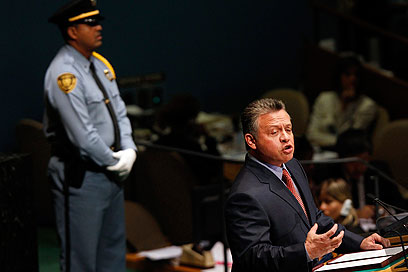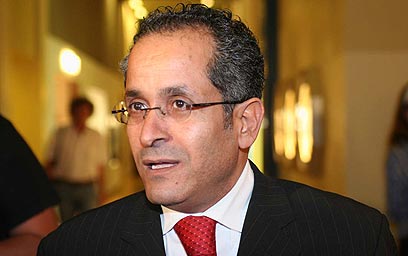
Jordan's King Abdullah II is dissatisfied with Benjamin Netanyahu's conduct, and considers the prime minister "a rightist who rejects the peace process," Jordanian officials told the London-based Al-Hayat newspaper on Saturday.
The claims come alongside reports that Jordan has named a new ambassador who is to be sent to Israel, after over two years that the role remained vacant.
Related articles:
- Jordanian official: No tension between Israel, Jordan
-
King Abdullah: Israel disrupting Jordan's nuclear plans
-
Jordan urges world to revive Mideast peacemaking
This is the second time in a month that the Jordanian monarch speaks out against the Jewish state; on September 12 he accused Israel of sabotaging his country's nuclear program.
"When we started going down the road of nuclear energy for peaceful purposes, we approached some highly responsible countries to work with us," he told AFP. "And pretty soon we realized that Israel was putting pressure on those countries to disrupt any cooperation with us."

King at UN General Assembly (Photo: Reuters)
The Jordanian sources told Al-Hayat that the decision to send a new ambassador was linked to a similar decision made by the Egyptian government. Jordan's new envoy is Walid Obeidat, a longtime diplomat and a consultant in the country's foreign ministry. The former ambassador, Ali Al-Ayed, was recalled to Jordan in 2009 in protest against Israel's Cast Lead Operation in Gaza. He was not sent back and in 2010 was appointed as communications minister.
According to the Asharq Alawsat newspaper, Obeidat was appointed to the role a year ago but was not sent to Israel in protest against the Jewish state's policies towards the Palestinians and the fact that the peace process was stalled.
The ties between the two countries suffered a blow as result of the 2009 offensive on Gaza and deteriorated further during Netanyahu's term as prime minister. Netanyahu met with the king only once since getting elected, over three years ago.

Former Ambassador Al-Ayed (Photo: Gil Yohanan)
Jordan's minister of information, Samih al-Maaytah, denied in an interview with the paper that there is any change or deterioration in the relations between Amman and Jerusalem, but hinted that such a downturn could happen if "Israel continues to hinder the peace efforts." He branded the decision to send an ambassador "a natural step."
"The Jordanian stance is clear to everyone, and the preservation of the Jordanian and Palestinian interests obligate us to maintain the peace accords," he added.
King Abdullah II addressed the UN General Assembly earlier this week, and said that the Israeli settlement construction is causing setbacks in Jordan's attempt to mediate talks with the Palestinians.
"Earlier this year, in Amman, we succeeded in getting both sides back to the table for exploratory talks," he explained. "Then positive traction stopped again. Illegal settlement-building and unilateral actions continue, constituting direct threats to a negotiated peace."
- Receive Ynetnews updates
directly to your desktop















